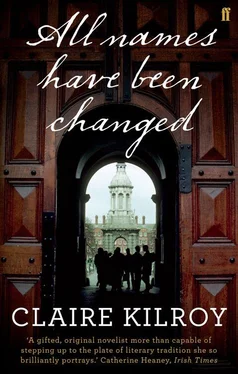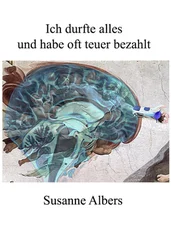Claire Kilroy - All Names Have Been Changed
Здесь есть возможность читать онлайн «Claire Kilroy - All Names Have Been Changed» весь текст электронной книги совершенно бесплатно (целиком полную версию без сокращений). В некоторых случаях можно слушать аудио, скачать через торрент в формате fb2 и присутствует краткое содержание. Год выпуска: 2010, Издательство: Faber & Faber, Жанр: Современная проза, на английском языке. Описание произведения, (предисловие) а так же отзывы посетителей доступны на портале библиотеки ЛибКат.
- Название:All Names Have Been Changed
- Автор:
- Издательство:Faber & Faber
- Жанр:
- Год:2010
- ISBN:нет данных
- Рейтинг книги:5 / 5. Голосов: 1
-
Избранное:Добавить в избранное
- Отзывы:
-
Ваша оценка:
- 100
- 1
- 2
- 3
- 4
- 5
All Names Have Been Changed: краткое содержание, описание и аннотация
Предлагаем к чтению аннотацию, описание, краткое содержание или предисловие (зависит от того, что написал сам автор книги «All Names Have Been Changed»). Если вы не нашли необходимую информацию о книге — напишите в комментариях, мы постараемся отыскать её.
All Names Have Been Changed — читать онлайн бесплатно полную книгу (весь текст) целиком
Ниже представлен текст книги, разбитый по страницам. Система сохранения места последней прочитанной страницы, позволяет с удобством читать онлайн бесплатно книгу «All Names Have Been Changed», без необходимости каждый раз заново искать на чём Вы остановились. Поставьте закладку, и сможете в любой момент перейти на страницу, на которой закончили чтение.
Интервал:
Закладка:
Antonia had spent a whole summer on that same ward two years previously, also being treated for clinical depression, which is where they got her started on exploring her creativity, painting at first, or ‘daubing’ as she called it, since she showed no aptitude. The writing suited her better. Though this information was offered with the best of intentions, I don’t see how Aisling could possibly have taken heart from it. Antonia was far from cured. Nor could I fathom how two individuals enduring such diverse symptoms could both be diagnosed with the same condition. But then, I wasn’t a doctor. Maybe Aisling wasn’t telling us the full story regarding what had gone wrong with her. Maybe she hadn’t been told the full story either.
It goes without saying that we barely knew her without the stark make-up, hardly recognised her in colour. We saw the few spots she’d been trying to conceal all year. They weren’t so bad, after all that, nowhere near as bad as I’d imagined. You’d scarcely notice them at all, really, but there was no right way of telling her, so I didn’t.
She was dressed in a pair of pink flannel pyjamas printed with teddy bears, a small cross-legged bundle on the bed, overcome with shyness. I felt like I’d come to babysit. Already she was changing, fading. She would not be herself much longer. The hospital would cure her of being Aisling. I missed her then, a crippling pang, though she was still right there beside me, sort of.
I gave her the Walkman bought from Giz in the end, and a Bowie compilation. The Ziggy years, not the Eno stuff, to be on the safe side. The girl had enough on her plate. She had told us once, in the early days before any of us really knew one another, that she didn’t believe anything bad could happen to you while you were listening to David Bowie. I dismissed the statement as foolish at the time, but the bad things she’d been referring to took place in her head, so her theory made sense, when you thought about it.
Her face lit up. ‘Guess what?’
‘What?’
‘Professor Glynn came in to see me today.’ A diffident trace of pride in her voice.
‘Really? That was decent of him.’
‘Yeah,’ she agreed. ‘He showed up with a bunch of flowers and a black eye.’ She nodded at her bedside locker. Amongst the Get Well Soon cards was a vase of white roses.
‘A black eye?’
She nodded. ‘And a broken tooth.’
I was surprised when she started to snigger. Surprised and relieved. A flash of her old self. Not gone yet, so. Not yet. Crippling, as I say.
He never saw his attackers. That’s the story he put about. At least four of them had set upon him from behind and kicked the tooth right out of his head. He’d gotten the better of them in the end, overpowering them with a left hook followed up by a sharp right, but that’s why he hadn’t been there to help when she’d collapsed, he wanted Aisling to know. He’d since made a speedy recovery and was right as rain, he had assured her bravely.
I shook my head. ‘Who could do such a thing to him?’
‘I know. Desperate.’
‘He told me that I was not to worry about all this,’ she added, gesturing at her surroundings. ‘He said it was just because I was young.’ We let that hang in the air, both of us hoping Glynn was right. Aisling lowered her head. She didn’t quite know what to do with her hands, now that she’d been stripped of her amulets. The pyjama sleeves were too long for her.
‘It was too much for me,’ she quietly admitted.
‘I know,’ I said, as gently as I could manage.
‘It got too much for me, Declan,’ she confessed again some minutes later, looking me anxiously in the eye as if I would think less of her for this admission.
‘I understand,’ I said, as softly as I was able.
*
Giz was next.
I’d seen him just the once since the Pushers Out vigilantes broke his window and nailed that funeral wreath to our door. He’d been evicted shortly afterwards. I was walking back into town after a visit to Aisling when there he was on the north quays ahead of me. The pneumatic white runners were gone, replaced by an old pair of builder’s boots. They must have been weighted down with steel caps, the way he hauled them along the pavement, as if they were magnetised to it. No shoelaces, never mind socks. His left arm dangled limply by his side, and his left leg dragged, slightly twisted.
I trailed along behind him at a discreet distance. We made slow progress past the courts. He collided over and over with the railings. It was a beautiful, such a beautiful morning in late April, one of those gifts the world unexpectedly bestows on you, warmth and light flooding into your bones after the siege of an Irish winter, so long, so hard, so damp, that you’d forgotten how good the sun felt, the giddying glory of it on your bare skin. The railings turned a right angle, and Giz veered around the corner with them, involuntarily by the signs of it. His good arm reached for the other side of the street, flailing towards it like a swimmer caught in an undertow. I crossed briskly at the lights, pretending that I hadn’t seen him, nor heard the moan of appeal that indicated that he had seen me.
I glanced back from the safety of the other side. The broad splendour of the Liffey, glinting and sparkling in the late spring sun, the smoky blue of the distant mountains. Giz was still floundering by the railings, a stalled clockwork toy, needing to be turned around and set on his way again. He was making the noise, the junkie noise, a wheedling mixture of pleading and complaint, the terrible wa-aa-aa that was general all over Dublin during the heroin years, ringing out of every side street and back lane. Wa-aa-aa ; how it carried.
During the numb, tentative weeks following Aisling’s hospitalisation, small acts of localised kindness gained a new significance in the order of things. I finally left my bed in the dead of the night and went out to see if I could comfort the dog that had been howling away the year, lonely as a wolf. I wanted to feel like a better person.
I followed the howl down a lane separating two rows of back-to-back terraces. I hadn’t considered what I would do if I found the dog. Talk to him, I suppose. Tell him he wasn’t alone. The lane rounded a corner and opened onto a clearing where I encountered not a dog but a group of men, too far away to have noticed my intrusion. No, not too far away, but too intent on whatever was squirming at their feet. They were lit from above by a security lamp rigged up to a garage.
One of the men spoke, and the dog stepped up his howling. A dogfight, was my first reaction. Another of the men nudged the creature on the ground with the toe of his boot, and the creature raised its hands in defence. Not a pit-bull terrier, but a boy, no wait, a man, a thin scrawny man, head shaved. He was on his knees, wheedling ingratiatingly though they hadn’t started on him yet. Merciful Jesus, it was Giz.
‘Wa-aa-aa,’ he was saying, palms upturned in supplication. The men started to laugh. They laughed for a good while at his distress, then Giz, the poor bastard, tried to join in. This brought abrupt silence. Even the dog stopped howling to listen.
One of the men said something, to which Giz shook his head in vigorous denial. The man kicked him. His foot caught Giz under the chin, snapping back his neck. That was the signal. The circle of men crumpled as if the ground had sucked them down on top of Giz. His screams were indescribable. I started to run, not to his rescue, but away from him, out of there, back to where I’d come from.
The first phone box had no dial tone. The cash lock had been jemmied open, ‘Giz woz ere’ scratched into the metal casing. The second phone box had no receiver at all. By the time I reached the third one, I knew there was no point in running any more. Whatever had been done to Giz was over with. I reported what I’d seen to the Guards.
Читать дальшеИнтервал:
Закладка:
Похожие книги на «All Names Have Been Changed»
Представляем Вашему вниманию похожие книги на «All Names Have Been Changed» списком для выбора. Мы отобрали схожую по названию и смыслу литературу в надежде предоставить читателям больше вариантов отыскать новые, интересные, ещё непрочитанные произведения.
Обсуждение, отзывы о книге «All Names Have Been Changed» и просто собственные мнения читателей. Оставьте ваши комментарии, напишите, что Вы думаете о произведении, его смысле или главных героях. Укажите что конкретно понравилось, а что нет, и почему Вы так считаете.












